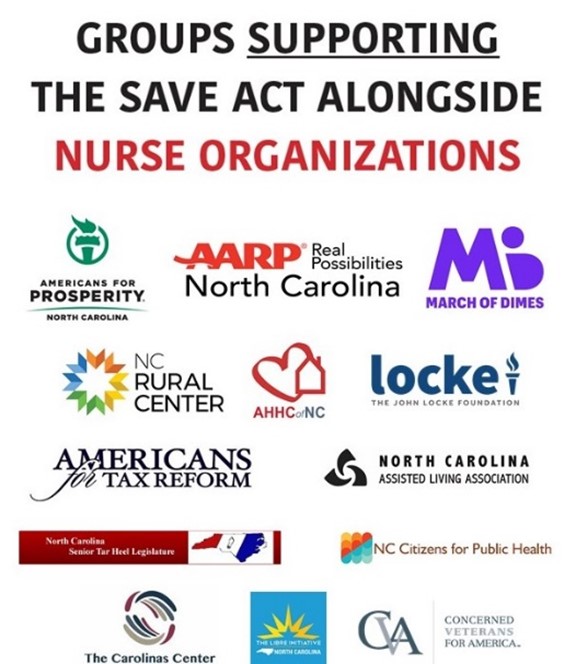SAVE Act Aims to Help NC Patients Access Healthcare Providers
For Immediate Release
March 11, 2021
RALEIGH, NC - Access to quality healthcare continues to be one of the most important issues facing North Carolina. On Thursday, legislators took a major step towards improving access with the introduction of the SAVE Act (SB 249/HB 277). This bipartisan legislation would cut outdated red tape for Advanced Practice Registered Nurses (APRNs) and bring North Carolina in line with long-established national standards.
The primary objective of the SAVE Act is to modernize regulations and allow APRNs to work to the full extent of their training and education. The end result for patients is a shovel-ready improvement to North Carolina’s healthcare system that can immediately deliver better care, faster access, and lower costs.
“We desperately need better healthcare in Western North Carolina now more than ever, and the SAVE Act is a golden opportunity to bring back a big win for patients in my district and, frankly, every other district in North Carolina,” said Sen. Ralph Hise, R-Mitchell. “I know my colleagues throughout the state are looking for big wins for their constituents, too, and I would challenge them to offer a bipartisan healthcare solution that can offer as much as this bill.”
Primary sponsors of The SAVE Act include Hise; Sen. Joyce Krawiec, R-Davie; and Sen. Jim Burgin,
R-Harnett in the Senate. Meanwhile, all four Registered Nurses serving in the General Assembly have lined up to support the bill as primary sponsors in the House: Rep. Donna White, R-Johnston; Rep. Gale Adcock, D-Wake; Rep. Carla Cunningham, D-Mecklenburg; and Rep. Diane Wheatley, R-Cumberland.
The SAVE Act is supported by a large group of more than a dozen diverse organizations from across the political spectrum, including AARP North Carolina, Americans for Prosperity North Carolina, the March of Dimes, the Rural Center, and others. There are no known groups opposing the legislation outside of physician organizations; those typically raise patient safety concerns, despite a lack of evidence that APRNs provide sub-standard care.
March of Dimes, the Rural Center, and others. There are no known groups opposing the legislation outside of physician organizations; those typically raise patient safety concerns, despite a lack of evidence that APRNs provide sub-standard care.
“Today’s SAVE Act bill brings to fruition the work of Florence Nightingale, the Lady with the Lamp, who envisioned and created the profession of nursing,” said Rep. White. “The COVID pandemic of 2020-21 has put a spotlight on the critical need and value of nurses in advanced practice roles to perform at their full scope of education and experience. I commend this bill wholeheartedly as its time for passage is fully upon us.”
A 2015 study by Dr. Chris Conover, then a healthcare economist with the Duke University Center for Health Policy and Inequalities Research, showed that removing barriers such as outdated “physician supervision” requirements would save North Carolina between $433 million and $4.3 billion per year while creating more than 3,800 jobs. Critically, his research showed those changes would improve access to care without sacrificing quality.
“APRN regulations haven’t been seriously updated in more than 40 years. While some of these rules may have made sense in the 1970s, healthcare has evolved a lot in the last four decades. APRNs have evolved in the last four decades,” said Dennis A. Taylor, RN, DNP, PhD, ACNP-BC, FCCM, President of the North Carolina Nurses Association. “The status quo is unnecessary, expensive, and ultimately makes it harder for patients to seek the care they need, particularly in rural and marginalized communities.”
Polling from AARP North Carolina in 2019 showed widespread support for this type of legislation, with 86% of Republicans and 86% of Democrats both saying they support Full Practice Authority for APRNs.
“When it comes to quality health care, we need to make it easier for older adults to get timely medical services from providers they trust. With a lack of physicians in rural counties, and long wait times for many in urban areas, Advance Practice Registered Nurses should be able to more fully use their skills and training to help reduce wait times and the distance required for patients to access the care they need,” said Catherine Sevier, AARP North Carolina President.
Some other goals of the SAVE Act include moving all regulatory oversight of APRNs to the Board of Nursing, along with updating remaining items to bring all four APRN roles to the nationally-recognized definition of Full Practice Authority in North Carolina.
MEDIA CONTACT
Chris Cowperthwaite, APR
Director of Communications & Outreach
(919) 821-4250 or chriscowperthwaite@ncnurses.org
ABOUT NCNA
As the leading professional organization for North Carolina’s registered nurses, we equip nurses at all stages to thrive in an ever-changing healthcare environment. NCNA helps keep North Carolina nurses on the cutting edge of nursing practice, policy, education, and more. Join us as we work to advance nursing and ensure high-quality healthcare for everyone.
Established in 1902, NCNA provides continuing education, networking and legislative advocacy for registered nurses throughout North Carolina. For more information, please visit www.ncnurses.org.
MISSION STATEMENT
The North Carolina Nurses Association serves the changing needs of its members, addresses nursing issues, and advocates for the health and well-being of all people.